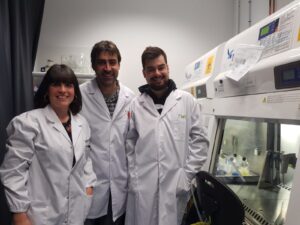
Acute lymphoblastic leukemia (ALL) accounts for one quarter of all cancer cases diagnosed in children and young adults, and also has the highest death toll among these age groups. Although the vast majority of patients respond well to treatment, in around 15-20% of cases, the cancer grows back. The current standard-of-care for these patients is to administer aggressive therapies which, while life-saving, can also induce long-term side effects, including mental and physical disability.
A new IBEC-led publication in the scientific journal Frontiers in Cell and Developmental Biology addresses an urgent need to develop more personalised therapies that cater to each patient, while reducing the side effects often brought on by a “one size fits all” approach to treatment. The study was senior-authored by Joan Montero and first-authored by Albert Manzano, Senior Researcher and PhD student in IBEC’s Nanobioengineering group, respectively. Nanobioengineering Group Leader Josep Samitier and Senior Technician Clara Alcon also contributed to the work, as well as researchers from several other institutes including the University of Barcelona.
Predicting treatment response
In this study, the researchers used dynamic BH3 profiling, a novel methodology that measures the capacity of drugs to prime cells to die, to evaluate new treatments that could improve outcomes for B-cell precursor ALL (BCP-ALL) patients, especially those who have relapsed. In this technique, anti-cancer drugs are administered to cells in a laboratory. Researchers can thus analyse early apoptotic events to determine whether the drugs will kill the cells—in this case, leukemia cells. As a result, this technique is an accurate predictor of treatment effectiveness, and also significantly cuts analysis time, since researchers don’t need to wait for the cells to die. “This current work uses this technique to evaluate and accurately predict the effectiveness of sequential treatments for pediatric ALL”, says senior author Joan Montero.
The study also investigated how different genetic variations of BCP-ALL responded to antitumor drugs in combination with BH3 mimetics, small molecules which specifically block the proteins that prevent the cancer cells from dying. These cell death inhibitors are a hallmark of cancers that have become resistant to treatment.
We found that many of the drugs, which were only modestly effective when administered on their own, killed a significantly higher proportion of cancer cells when administered in combination with BH3 mimetics.
Albert Manzano, first author of the study
In fact, the effect was often synergistic, most notably in the dual inhibition of the proteins MEK and MCL-1, which achieved almost complete elimination of the leukemia cells. These results may be particularly relevant in designing novel therapeutic combinations for patients whose cancer has grown back.
Towards personalised medicine for pediatric leukemia

Overall, their results demonstrate the usefulness of dynamic BH3 profiling in predicting the best treatment combination for each patient and boosting the potency of therapy. Furthermore, it demonstrates that BH3 mimetics can enhance anti-cancer therapies to treat ALL, and overcome resistance by blocking the proteins that prevent cancer cell death. In addition, since the effect of the BH3 mimetics is often synergistic, lower concentrations of each drug will be required, and patients will therefore be less likely to suffer severe side effects.
Importantly, these observations were all made after only a very short incubation time, emphasising the utility of these functional predictive assays in the clinic. In all, these findings could represent promising new therapeutic strategies for this leukemia type.
We hope that this and future studies in our lab can help pediatric leukemia patients achieve recovery with minimum possible adverse side effects
Joan Montero, IBEC.
Reference article: Albert Manzano-Muñoz, Clara Alcon, Pablo Menéndez, Manuel Ramírez, Felix Seyfried, Klaus-Michael Debatin, Lüder H. Meyer, Josep Samitier and Joan Montero. MCL-1 Inhibition Overcomes Anti-apoptotic Adaptation to Targeted Therapies in B-Cell Precursor Acute Lymphoblastic Leukemia. 2021, Front. Cell Dev. Biol. 9:695225.





